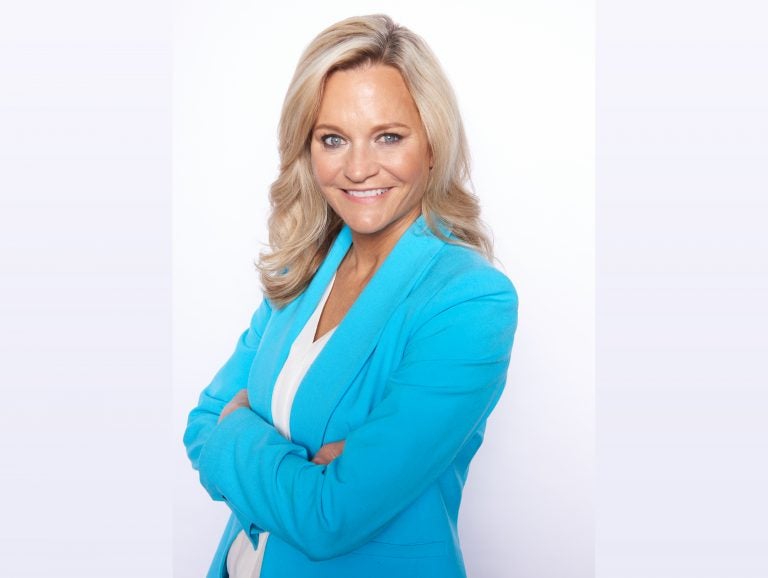When 2 Philly-area execs were accused of harassment, their companies called this woman
Several of the prominent men accused of sexual harassment recently have said they're getting help for their behavior. But what does that actually mean and does it really work?
Listen 6:25
Sarah Bridges (photo provided)
Several of the prominent men accused in recent months of sexual harassment, including Harvey Weinstein and Kevin Spacey, have said they are either “in counseling” or seeking “evaluation and treatment” for their behavior. But what does that actually mean, and does it really work?
It turns out, some companies actually seek treatment on behalf of employees accused of misconduct.
A scenario might go something like this: You work in human resources for a major Fortune 500 company, and sexual harassment complaints have been made against one of your top executives. But this guy is really valuable to the company. Maybe he even started the company. And you honestly think, maybe he could change.
WHYY’s Nina Feldman spoke with Minneapolis-based corporate psychologist and executive coach Sarah Bridges, who is hired by companies to come in and see if she change the behavior of executives who’ve been accused of harassment. Bridges estimates her business has quadrupled in the #MeToo era.
They started out by walking through the case of an executive Bridges worked with at a health care company in Philadelphia.
–
Note: This conversation has been edited for length and clarity. We are not using the names of Sarah Bridges’ clients.
I was called in to work with one of their senior executives, who had gotten into trouble for sexually harassing behaviors of different stripes. A lot of it had to do with being very touchy with women, in terms of stroking their back, grabbing their arms, hugging them — even people who didn’t want to be hugged. But it even crossed beyond that … He was at a party once and pulled a woman onto his lap. It was videotaped, as corporate functions often are.
And ultimately, several women came forward and said, “I’m really uncomfortable. He’s a mentor to me. He’s my boss, and I don’t feel like I can say anything because of the power difference.”
And the HR person reached out to me, and I flew in to meet with him and start the process.
So, what is the process?
So the very first thing I do, of course, is meet with HR and any other key stakeholders. But next I have a deep dive interview with the individual who has these issues going on. And so we sit down, often for several hours, and really talk through what has happened — their perspective.
From there, I’m doing in-depth personality testing. They’re not diagnostic tests. I’m not testing for mental illness. I’m testing for personality traits like impulsivity, empathy, personal insight, and so-on to really try to understand what underneath is driving some of these behaviors.
And can you give some examples of the personality traits that are often what’s driving the behavior that’s going on?
Yeah, I have some usual suspects. One common one is someone who’s quite low on what we call casually “EQ” or “emotional intelligence.” They just are not adept at understanding the reaction others have to their behavior. So they’re aware of what they’re intending to do, and assume that lines up with how people perceive them. And it often doesn’t.
Another scenario that I see a lot are people that are very impulsive — and quickly, and this can manifest in being angry. It can manifest in some of the sexually harassing behaviors.
So in this case, [with the health care executive] what did you find after running the battery of personality trait tests?
Talking to him, it was really clear that he did care about this issue, and was quite mortified that the women had been so upset by his behavior. He saw himself as a mentor — he did, indeed, mentor a lot of women along the way. And he cared a lot — his empathy was high. That said, his personal insight was pretty low, and he tended to be a bit impulsive. And when he thought, “Wow, I’m nurturing, I’m really giving support to people, I really want to show empathy,” he thought he did that by hugging people and touching their arm.
And so we had to do a lot of work around what he thought he was doing and how people received it. I sat down and had face-to-face discussions with a number of people who worked around him, and provided that confidential feedback to him. And he was motivated to change, which was a huge asset.
So what was your routine with him like?
We met every other week in a six-month period. The piece we don’t do in coaching, because I’m not a therapist, is to say, “How is that you came to be impulsive? What in your childhood?” What we’re interested in is, “You are impulsive. What are the strategies you can do on the job that you can practice in between our sessions?”
How do you track that behavior?
Because of the situation we’re in, the organization is involved and we contract about that up front. HR’s going to be involved. His boss is going to be involved. These folks are going to be my internal partners to not only help with accountability, but secondly, to help with feedback — where it’s going well or if they see anything that seems to be relapse.
In this case, it was quite black and white. No hugging, no touching. Period. And so if that had come back as feedback, that would’ve been grounds for him to be terminated.
So in this case, it sounds like he did not relapse. At what point do you say, “Okay, it’s worked. You’re rehabilitated?”
I would consider it a success if somebody has made it a year without any kind of relapse. But that is not when the accountability and oversight stops. What we did after the six months of very regular check-ins, is we went to quarterly, and I still check in with the organization.
Now, can you walk us through another local example that had a less successful outcome?
It wasn’t even less successful, it was a wholly unsuccessful outcome. So I worked with a person in Philadelphia that works for a professional services firm. He was a very senior person, very important to the firm. And I must have heard that phrase ten times when I went in. He was the primary person with one of their main clients, beloved by the client. They saw him as key to a lot of their revenue and so on. That’s a scenario where they’ll say, “Let’s bring the coach in.”
Right out of the gate, it was looking dubious. I had the long interview with him. He spent the whole time telling me why people were wrong, why other people in the firm did the same behavior, talk about why women should be discredited that had come forward, and so on. That’s a really big red flag in terms of turning this around.
But he was saying at this point that he wanted to do the coaching, and part of the problem with some personalities like his is they are pretty sophisticated and slippery in terms of knowing what to say at the right time and really being duplicitous.
He was married and would go out for a business function and people felt like he was being sexually aggressive towards them verbally and physically. And he said that he would stop this behavior, we contracted to it, and everything else. And within a month and a half, he had relapsed and was texting a female client again, and he was terminated.
How do you measure your success?
This may be a horrible analogy, but it’s a little bit like being an oncologist. You start with people who are quite ill. If 30 percent of people can turn it around, I consider that a big success.
Even in the worst scenario — in the sense that a person does it again and they’re terminated — that can be a real time that an organization turns a page culturally. That this sacred cow senior executive, everyone-knows-no-one-will-ever-fire Bob gets fired after years of behavior, that can be a real turning point and inflection point.
Can you talk about how people are thinking about this differently in the #MeToo era?
Well, I think it’s that they are sensitized now — that even a whiff, even the smallest signal that they may have this going on is something they need to act on, and that was not always the case.
One scenario I had recently was, “Oh we’ve heard for years rumors that he can be a little inappropriate on business trips with colleagues, but no one’s ever come forward.” Well, for years and years they did nothing. In this environment right now, I got a call about this. That’s not ok anymore.
When we’re in groups and something happens, we tend to stand around and assume somebody else is going to do something. So I see part of my work is not just to work with the harasser, not just to work with the victims, but also to infuse the culture in organizations with accountability, that we all are a part of calling out behaviors that cross the line, not expecting someone else will — not standing by and letting it happen.
—
Join WHYY’s Marty Moss-Coane of Radio Times and Maiken Scott of The Pulse as they lead conversations about sexual harassment and the #MeToo movement on Wednesday, March 28, at 7 p.m. Click here for more information about the “From Moment to Movement” event.
WHYY is your source for fact-based, in-depth journalism and information. As a nonprofit organization, we rely on financial support from readers like you. Please give today.





